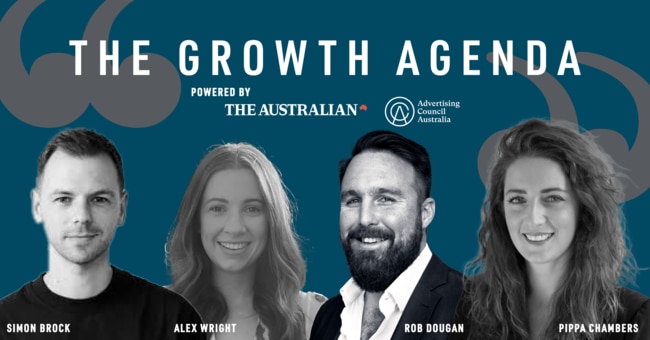The Growth Agenda podcast: Fantastic yet flawed, the role, rise and evolution of creativity and tech
“Data is just people in disguise and people are inherently flawed”, according to one guest on the latest edition of The Growth Agenda podcast which discusses the “fantastic bedfellows” and flaws of creativity and technology.

Creativity and technology make “fantastic bedfellows”, but marketers have not yet mastered the internal “data cultures” needed to match the same levels of creative cultures that have been steadily maturing.
In episode seven of The Growth Agenda (TGA) podcast, head of content at Catch Alex Wright, EGM for strategy and research at Tourism Australia (TA) Rob Dougan, and executive creative director and GM of Digitas Simon Brock discussed whether tech was driving creativity or vice versa.
Hosted by TGA editor Pippa Chambers, the guests looked at the rise of data-led insights and strategies that are supercharging creativity and pondered the role and future of both elements and to what extent they must coexist.
From questioning how brands should weigh up investment in these areas to if it was better to have a data-informed mindset rather than be solely data-driven, guests covered many hot topics and important themes.
“Sometimes there can be disappointment between the promise of technology and what brands and marketing actually get out of it,” Mr Brock said.
“Ultimately it's because not a lot of marketing teams have a really strong data culture. A lot of them have really strong creative cultures and know how to flex creativity, but they’re still maturing their data cultures …”
He said while most marketing teams have a creative culture, understand what great creativity is - as well as how to embrace, critique and buy it - the same confidence that teams have in technology and data to actually use that technology properly is lacking. This is also despite marketers spending more on data and tech, even though they can’t fully use it.
Mr Brock said as CMOs and CEOs with data, technology and customer backgrounds begin to lead those brand teams, that's where both strong creative cultures and strong data cultures will work together better to improve marketing.
Catch and TA have invested deeply in creativity this year having both worked with Aussie ad agencies to launch major brand campaigns in the ANZ market and also globally for TA.
While both brands believe in the power and need for creativity, they are investing deeply in tech and data. From using creative automation tools “to give content stretch” and help with rudimentary copywriting tasks, to tapping consumer facial recognition to understand reactions to creative, how and what each business is doing varies greatly.
Ms Wright said it’s a constant challenge juggling the balance between spend on tech vs creative, admitting it swings slightly towards investing more into tech, creative automation and data sets in order to set itself up for the future.
“We have an incredible amount of first party data at Catch which is fantastic, but what that tells us is what our audience has done in the past. It doesn't always guarantee us what they’re going to do in the future. So we’re always going to need an element of creativity and bravery,” Ms Wright explained.
“The data is only going to get us so far and that's something that we’re really continually having conversations about as we map out the plan for the next couple of years.”
While Catch is fortunate with its first party data sets, it can be somewhat “tricky” for TA given it doesn‘t have great visibility through the funnel and relies more on second and third party data.
“Brilliant creativity doesn't come from having more or less data than someone else, but brilliant creativity can be amplified better the more you know the audience you’re trying to talk to,” Mr Brock said.
Sydney-based Mr Brock, who has been at Publicis-owned Digitas Australia for nearly seven years, said regardless of a brand sitting on a bank of first party data or third party data, having perfect data is not possible.
“Perfect data doesn't exist because data is just people in disguise and people are inherently flawed. We have biases and we misunderstand things,” Mr Brock explained.
“So if data sets just tell us about people, the data will never be any more perfect than the people you‘re trying to understand.”
Listen to the full episode here, or via Spotify or Apple.





To join the conversation, please log in. Don't have an account? Register
Join the conversation, you are commenting as Logout